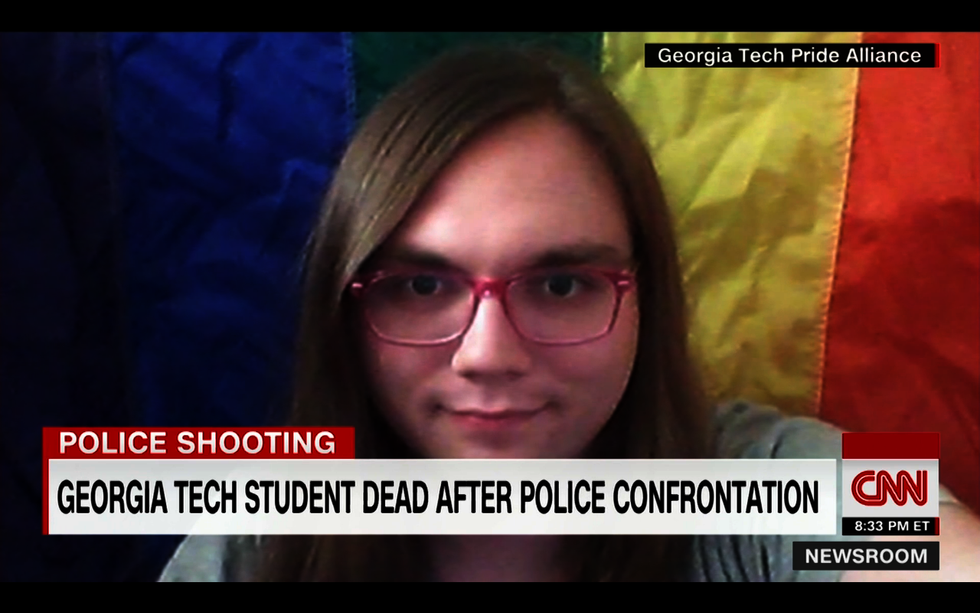
Screenshot photo of Scout Schultz from CNN.com.

Scout Schultz was a 21-year-old college senior with impeccable grades in a competitive program at Georgia Tech, just a few months away from graduation. He was well-known on campus for his activism and community leadership.
But by the end of Saturday night, he was dead after a bullet fired by a campus police officer pierced his heart, bringing a complicated and troubled life to a tragic end.
Scout identified as intersex and non-binary, which is to say he did not conform to the idea of being either male or female and preferred the pronouns "they" and "them." He was the president of the Georgia Tech Pride Alliance, an LGBTQ student organization.
Schultz's identity and activism came with a high price. The pressures of being open about his gender identity, being a social activist, and maintaining his academic performance weighed on him, according to a mental health counselor who knew Schultz. Schultz's father said Scout suffered from depression, and had attempted suicide once.
It's this backstory that led Schultz to his untimely end Saturday night, when campus police responded to a 911 call and found Schultz outside a dorm with a knife. The source of the 911 call? Schultz. He made the call that ended with his own death.
"Shoot me!" Schultz yelled to the officers as they tried to ask him what was wrong, and implored him to drop his weapon.
Schultz refused to engage the officers in conversation, or to comply with their orders to drop the knife. He continued to advance, and an officer fired one shot that hit Schultz in the chest. Schultz died at the hospital. The encounter was captured on video by a student recording on a cell phone (graphic content warning).
Three suicide notes were found in Schultz's room afterward.
Now, as is becoming more common in incidents such as this, the officer who shot Schultz is being accused by Schultz's father and by a family attorney who specializes in these cases of excessive force, despite video evidence showing Schultz advancing on the officers and ignoring their warnings.
"People have breakdowns sometimes," the attorney, L. Chris Stewart, said. "That doesn't mean they deserve to die."
Stewart alleges that police overreacted, and either lost patience or lacked training. He also questions why campus police weren't equipped with non-lethal options such as stun guns.
Now, the Georgia Bureau of Investigation is tasked with sorting through the facts of this event.
Scout Schultz put Georgia Tech police in an impossible situation. He called the police on himself. He reported the possibility that he had a knife and a gun (although no gun was found). He challenged armed officers who had every reason to believe Schultz had the capability to inflict deadly violence on them.
I believe it's safe to say that everyone from the officer who fired the shot to the family of the victim would have preferred a different outcome. But, even in such tragic circumstances it would be unfair to place the blame on a police officer whose life was in the balance of the decision he chose to make.
None of those officers clocked in that day looking to end a young man's life, but sadly, it appears that the young man picked up the phone that night looking to end his own. Healing of this tragedy won't be found in scapegoating, but in compassion for the victim's family and for the officers involved, and efforts to prevent incidents like this in the future.
(H/T CNN)